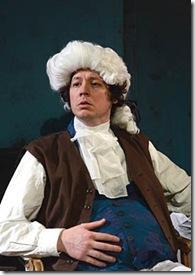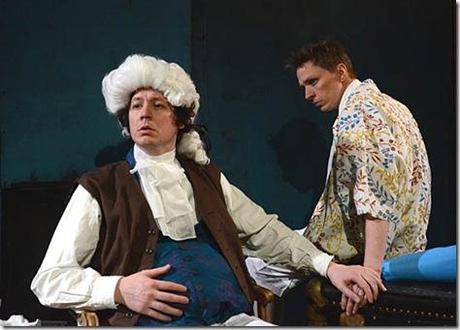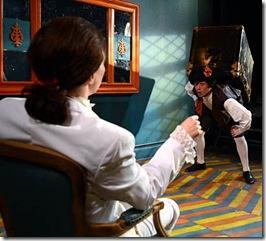
Sugarward
Written by Sean Graney
Directed by Geoff Button
at The Side Project, 1439 W. Jarvis (map)
thru Feb 10 | tickets: $15-$20 | more info
Check for half-price tickets
‘Sugarward’ is one sweet show

Side Project Theatre presents
Sugarward
Review by Joy Campbell
As the subject of his latest play, Sugarward, Sean Graney has chosen the “somewhat true and yet entirely implausible” story of Daniel Parke, a real-life, fairly unknown 18th-century Governor of the British Leeward Islands. Historical records of Parke reveal a man of brutal temper, driven by overweening ambition and earning a reputation as an insatiable philanderer. Hoping to secure a position in the British Parliament, Parke was instead appointed by Queen Anne to the aforementioned Governorship, which was by no means insignificant.

Graney’s Parke arrives at Antigua a self-important fop full of zeal for his mission, and is struck by the polarity of society there: instead of the various classes that occupy the stations between nobility and the poor to which he is accustomed in England, there are instead simply the very wealthy and the very poor, as the use of slaves on the sugar plantations has removed the need for tradesmen, i.e., the middle class. In Graney’s version, Parke sees his appointment as an opportunity to redeem himself and bring the Queen’s justice to his governed land; he’s a very flawed person, even ridiculous, but he believes in the rightness of what he does.
The play takes place in two acts: the first, shortly after Parke’s arrival; the second, four years later. As Colonel Daniel Parke, John Henry Roberts plays to pompous perfection the naïve idealist so righteously certain of his mission that he grossly underestimates the power structures of the world into which he’s entered. Three other characters represent the various interests of that society: Kirby, Parke’s affable servant, a poor man who has struggled under the oppression of the wealthy sugar barons; Codrington, a moderate sugar baron whose lands were given to his father by King William; and Chester, a sugar baron for whom the ends justify the means. A brutalizer of slaves who illegally trades with the French and Dutch, Chester is a ruthless mercenary who sees economic gain as the ultimate political loyalty.
All three characters are played brilliantly by Joel Ewing, who makes each a distinct and whole persona. A winking nod is given to this device when Parke calls for Kirby, only to have his servant shout from offstage that he’ll be in as soon as he “sets some garments aright.” The chemistry between Roberts and Ewing, even when in conflict, is electric, and Graney’s dialog passes between them like a whirring badminton shuttlecock.
For all its political ramifications, this is not some dry academic treatise or obvious, condescending polemic. Graney’s script gives us dialog laced with the humor of the mundane and of human folly, and it sparkles under Geoff Button’s insightful direction and the cast’s nuanced performances. There are a lot of intelligent, beautiful, hilarious exchanges in this show; I found myself smiling through almost all of the first act. There are some plays where simply experiencing each moment is a pleasure; this is one of them.
In the second act, Roberts shows us a more complex character, one clearly struggling with the ruin his attempts at order have caused to good men along with bad. That his impounding of illegally traded items nets him material gain further complicates the question of his motives, although as played, Roberts shows us a flawed man who yet believes in bringing true justice to the islands. For all of his good intentions, however, his inflexibility and failure to operate within the realities of his domain prove fatal flaws.
I loved everything about this show, from the unique script to the top-notch performances and direction, to The Side Project’s intimate performance space. Congratulations – and thanks – to Sean Graney for another beautiful piece of theater.
Rating: ★★★★
Sugarward continues through February 10th at The Side Project, 1439 W. Jarvis (map), with performances Thursdays-Saturdays at 7:30pm; Sun 3pm. Tickets are $15-$20, and are available online through BrownPaperTickets.com (check for half-price tickets at Goldstar.com). More information at TheSideProject.net. (Running time: 1 hour 45 minutes, includes an intermission)
Photos by Scott Dray
artists
cast
John Henry Roberts (Col. Daniel Parke); Joel Ewing (Thomas Kirby, Christopher Codrington, Jr., Edward Chester)
behind the scenes
Geoff Button (director), Rebecca Butler (stage manager), Michael Manocchio (dramaturg), Maria de Fabo (scenic, props design), Jeff Glass (lighting), Adam Goldstein (dialect coach), Brian Ruby (production coordinator), Hannah Dawe (assistant director), Kelsey Ettman (costume design), Stephen Gawrit (sound design), Michael Buonincontro (wig stylist), Renée Witherwax, Jason Smith (graphic design), Scott Dray (photos)
13-0103

